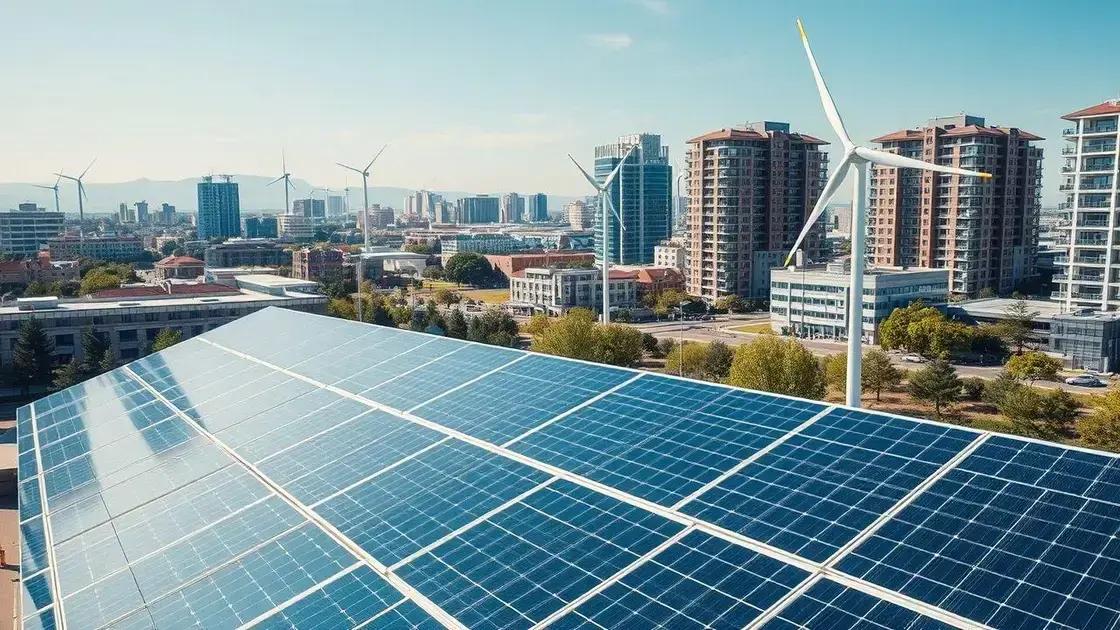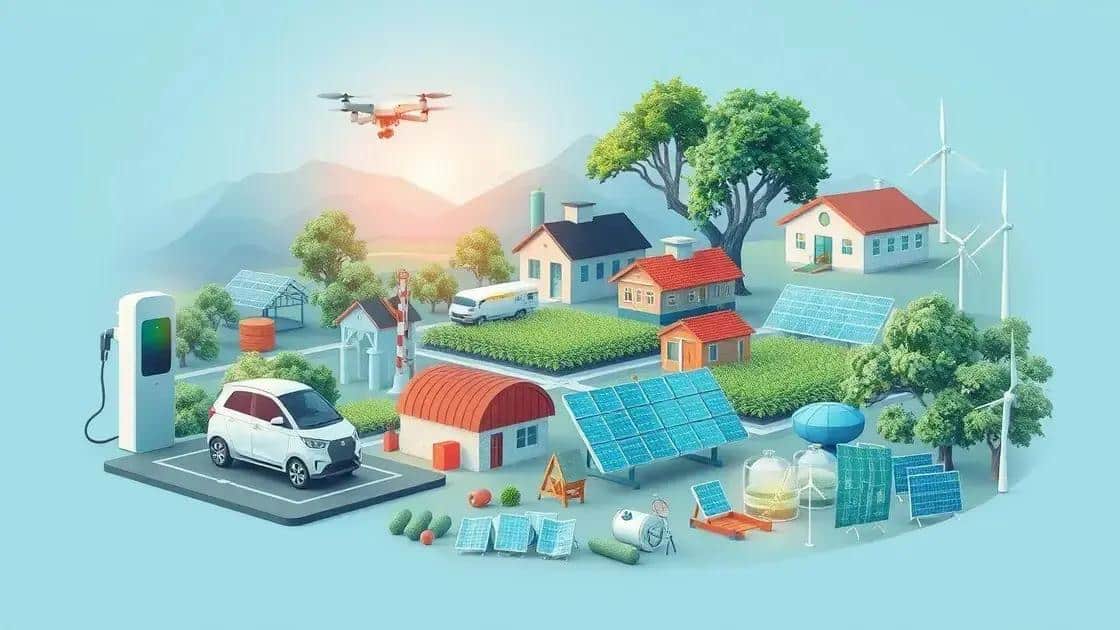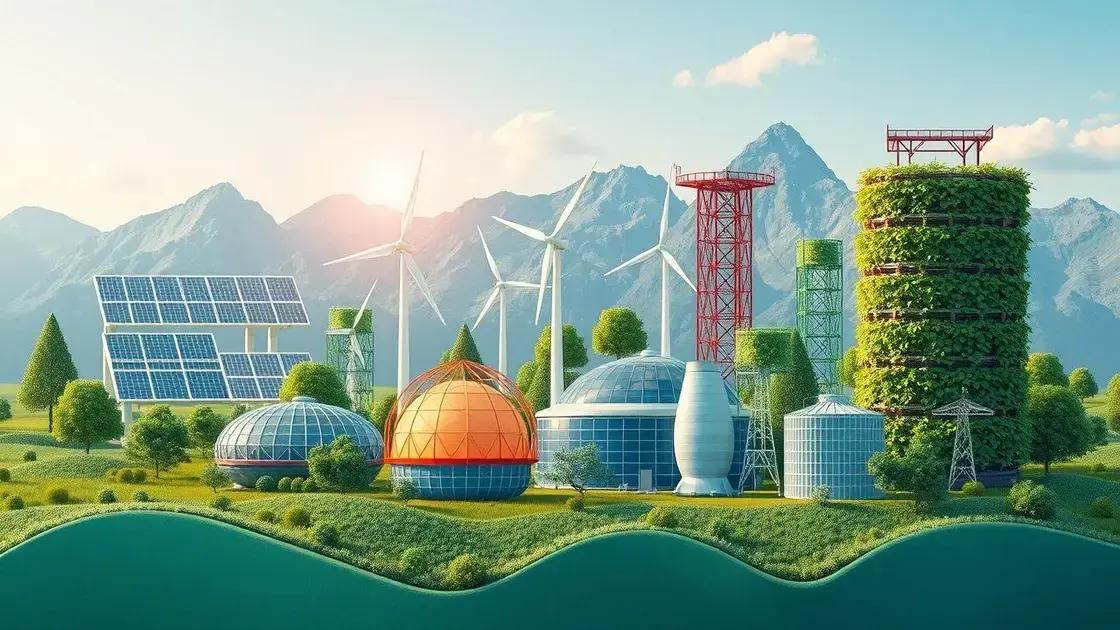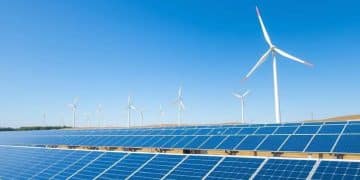Climate tech developments trends reshaping our future

Climate tech developments trends are driving significant innovations in renewable energy, smart technologies, and sustainable practices, ultimately reshaping industries and promoting a greener future.
Climate tech developments trends are critical as we confront climate change. With innovative solutions emerging, how can these advancements redefine our approach to sustainability? Let’s explore their potential impact.
emerging technologies in climate tech
Emerging technologies in climate tech are changing the landscape of how we approach environmental challenges. With advances in technology, we can enjoy a more sustainable future.
One key area is renewable energy. By harnessing sources like the sun and wind, we reduce our reliance on fossil fuels. These technologies include:
Solar Energy Innovations
Solar panels are becoming more efficient every year. New materials are being developed that capture sunlight better, ensuring we use as much energy as possible.
Wind Power Advances
Wind turbines are also evolving. Modern designs capture wind energy more effectively, requiring fewer turbines to generate the same power. This means less land usage and better integration into existing landscapes.
- Improved turbine blade designs for efficiency
- Offshore wind farms utilizing vast ocean spaces
- Energy storage systems to manage supply
Another exciting development is electric transportation. Electric cars and buses are becoming more common, reducing emissions and contributing to cleaner air.
In addition, carbon capture technology is gaining traction. This process captures CO2 emissions from sources like power plants, preventing them from entering the atmosphere and helping to tackle climate change.
Innovations such as bioenergy and hydrogen fuel cells also play a significant role in our transition to a more sustainable future.
With the rise of smart grids, energy distribution becomes more efficient. These grids optimize energy flow and enhance the integration of renewable resources. As technology progresses, the potential for emerging climate tech innovations is limitless.
impact of climate tech on industries

The impact of climate tech on industries is profound, changing how businesses operate and engage with the environment. From manufacturing to agriculture, technology plays a crucial role in building a sustainable future.
In the manufacturing sector, companies are adopting cleaner technologies. These innovations reduce waste and energy use, making production more efficient. For instance, 3D printing minimizes material waste compared to traditional methods.
Energy Efficiency Improvements
Many industries are implementing energy-efficient practices to lower costs and carbon footprints. This shift includes:
- Using energy-efficient machinery and appliances
- Implementing building automation systems
- Utilizing renewable energy sources
Furthermore, the agricultural industry benefits from climate tech. Smart farming techniques enhance productivity while minimizing environmental impact. Technologies such as precision agriculture allow farmers to optimize water and fertilizer use, leading to healthier crops and reduced pollution.
Transportation is another sector significantly affected by climate tech. Electric vehicles (EVs) are gaining popularity as they offer a cleaner alternative to traditional fuel-powered cars. Additionally, logistics companies are exploring sustainable delivery methods to reduce their carbon emissions.
Innovations in Supply Chains
Moreover, climate tech is revolutionizing supply chains. Companies are investing in sustainable materials and circular economy practices. This shift helps reduce environmental impacts while meeting consumer demand for greener products.
As industries continue to embrace these advancements, the overall economic benefits become clearer. Companies that invest in climate technology often see increased efficiency, lower costs, and enhanced brand reputation.
challenges in adopting climate technologies
Adopting climate technologies presents various challenges that industries and organizations must navigate. These hurdles can slow the transition to more sustainable practices.
One major challenge is the initial cost of implementation. Investing in new technologies, such as renewable energy systems or upgraded machinery, can require significant financial resources. Many businesses may hesitate to make such investments without clear immediate benefits.
Resistance to Change
Another obstacle is the cultural resistance often found within organizations. Employees and management may be accustomed to traditional methods and hesitant to embrace new approaches. Training and education are essential to overcome this resistance.
- Providing training for new technology usage
- Encouraging a culture of innovation
- Involving employees in the decision-making process
Additionally, the complexity of integrating climate technologies with existing systems can be daunting. Businesses often struggle to find compatible solutions that work seamlessly with their current operations. Collaboration with technology providers can help in this integration process.
Furthermore, regulatory frameworks can present challenges as well. Policies related to environmental regulations may be unclear or vary by region, making it difficult for companies to adopt new technologies confidently. Staying informed about local regulations is crucial for smooth implementation.
Market Competition
Competition is another consideration. Companies may fear falling behind their competitors if they prioritize sustainability without seeing short-term gains. This fear can hinder the adoption of eco-friendly technologies.
Ultimately, addressing these challenges requires a strategic approach. Businesses must assess their unique situations and develop tailored plans to integrate climate technologies effectively.
the future of climate tech innovations

The future of climate tech innovations holds great promise as technology continues to advance. New solutions are being developed to tackle environmental challenges, transforming industries and improving sustainability.
One exciting area is the development of next-generation renewable energy sources. Innovations in solar and wind technology are making these sources more efficient and cost-effective. This trend is expected to lead to a greater reliance on clean energy in the coming years.
Smart Technologies
Smart technologies are also gaining traction. Smart grids, for instance, enable better energy management, ensuring that energy is distributed more efficiently. This means lower costs and less waste. Additionally, smart appliances in homes and businesses can help reduce energy consumption.
- Integration of AI in energy management
- IoT devices for real-time monitoring
- Automated energy-saving systems
Furthermore, innovations in sustainable agriculture are transforming how we produce food. Techniques like vertical farming and precision agriculture utilize technology to increase yields while minimizing environmental impact. These approaches can play a key role in addressing food security as the global population grows.
The use of biotechnology is another promising innovation. This technology can create sustainable materials and develop eco-friendly products. For example, biodegradable plastics made from natural resources are gaining attention as alternatives to traditional plastics.
Carbon Reduction Technologies
Carbon capture and storage (CCS) technologies are evolving as well. These innovations capture CO2 emissions from the atmosphere and store them safely. This contributes significantly to fighting climate change and reducing global warming effects.
Investments in research and development are vital for the future of climate tech. As businesses and governments prioritize sustainability, the demand for innovative solutions will increase, driving further advancements in technology.
FAQ – Frequently Asked Questions about Climate Tech Innovations
What are climate tech innovations?
Climate tech innovations refer to technologies designed to reduce environmental impact and promote sustainability, such as renewable energy sources and smart agriculture techniques.
How can renewable energy technologies help the environment?
Renewable energy technologies reduce dependence on fossil fuels, lower greenhouse gas emissions, and contribute to cleaner air and water.
What role does smart technology play in climate tech?
Smart technology optimizes energy management and resource use, making systems more efficient and helping to reduce overall energy consumption.
What are the economic benefits of adopting climate tech?
Adopting climate tech can lead to cost savings, job creation, and increased competitiveness for businesses, while also benefiting the planet.






